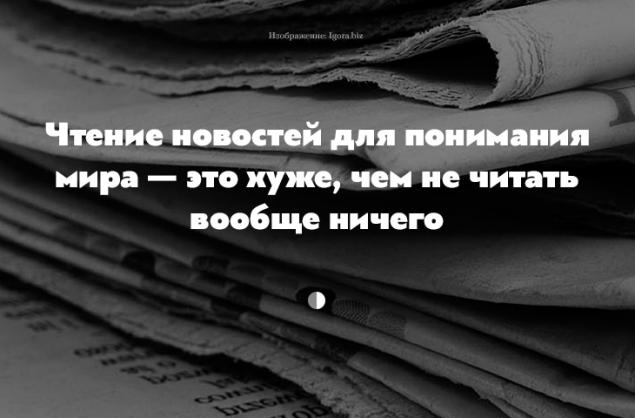1157
How to escape from the trap of news and stop worrying about what does not concern us

This article - an antidote to the news. It is long, so perhaps you could not fluent it read, because due to the mass consumption of news, many have lost the ability to read more than four pages at a time. < Website published a remarkable essay by Ralph Dobell on how to break out this trap if you are not bogged down too deeply.
news for the mind like sugar for the bodies so well informed, but we know so little. Why? Because 200 years ago, we came up with a toxic form of knowledge - the so-called news. It's time to reveal the devastating effects of the news and to take measures to protect themselves from danger.
< At its core we are cavemen in suits and dresses. Our brains are optimized for hunting and gathering, to live in small groups of 25 to 100 people, to survive in a limited amount of food and information. Today, our brains and body live in a world to which they do not fit. This leads to huge risks and risky behavior.
Over the past decade, the most successful of us realized the danger of living in conditions of excess food (obesity, diabetes) and began to change their diet. < But most of us do not realize that the news for the brain - it is for our body sugar is easy to absorb the news.. We are fed small pieces of simple information that does not apply to our lives, and that does not require mental effort. Therefore, we almost do not feel saturated. Unlike reading books and long articles that require mental effort, we can absorb an infinite number of bright news, such as bright as a little candy for our brain.
This is my attempt to clarify the dangers posed by the news, and to recommend ways to combat these dangers. I live for a year without news, so I can see and describe the results of this freedom: less distraction, more time, less nerves deeper thoughts, more discoveries. It is not easy, but it's worth
Reason number 1:. News systematically introduce us to zabluzhdenieNovosti give no real idea of the world. Our brain pays attention primarily on the visual, large-scale, sensational, scandalous, fast-flowing, high-profile information in the form of stories. And the brain because of its limitations do not really pay attention to long, abstract, slow and complex pieces of knowledge. Vivid stories are very useful for survival, "he appeared in the neighborhood man-eating tiger!". This is useful information. Therefore, the brain and used to pay her special attention. Media organizations in all growth using this cognitive distortion.
What do the television channels and newspapers? They focus on a bright visual image. The main thing - a picture, even if it hides more important, but the boring stuff. < Since our attention is captured, as a business model. Our brain enjoy delicious stories, they are easy to absorb.
Consider an example: car drives on the bridge and the bridge collapses. What they say on TV? About the car. About the driver. About where he was going. About what kind of man he was. What he had children. But all this does not matter. What is important? The structural integrity of the bridge. A flaw in the concrete bridge, which can lead to the collapse of other bridges. That is the lesson from this is to endure. What is the difference, what was the car? Any machine could bring down the bridge, it could be a strong wind or a stray dog. So why TV focuses on the car? Because it is a vivid and dramatic way, it's a personal story. And the news is cheap to produce. Why look for some experts on bridges and analyze the resistance of materials? The easiest way to interview a neighbor of the victim and make a photo mangled car
As a result of diligence media services, we have in mind is absolutely the wrong risk map:.
terrorism overvalued, chronic stress is undervalued bankruptcy of Lehman Brothers overrated, fiscal discipline is undervalued astronauts revalued, nurses are undervalued Britney Spears overstated, the report on climate change underestimated the crash overvalued, resistance to antibiotics is undervalued We are not rational, to resist the pressure of modern media. this is a very dangerous thing, because the risk assessment, which we get the news is completely different from the real risks that threaten us. View news about the plane crash will change your assessment of the risks, no matter how smart you are. If you think you will be able to compensate for this distortion by internal contemplation - you're wrong. Even bankers and economists who have a real incentive to resist the threats of news were helpless. The only solution - completely cut themselves off from news consumption
Reason number 2:.. The news is not important Over the past year you have read somewhere 10 thousand news stories Name at least one news story that allowed to make a right decision about an important aspect of your life, your career or business. Could you make that decision to obtain information from other sources, and not from the TV?
The idea is that the news that we show are not important with respect to the forces that really affect us. The best news entertain, but in any case they are useless. Imagine how strange it may sound, that you've found useful news. The news, which greatly improved your life. How much useless information to rework to get this valuable piece of information? We can not determine in advance the value of each news item, therefore forced to absorb everything. It's worth it? Hardly.
In 1914, the news of the murder of Franz Ferdinand was to overshadow all others in importance. But it was just one of the thousands of news. Soldier Svejk and Private reporter thought is nothing more than yet another political assassination. Certainly not a turning point in the history of mankind. The first web browser appeared in 1995. This is a huge step for mankind, which has remained without much media attention.
< People are very difficult to determine what is really important. It is much easier to define something new. We have no organs of perception of the importance of information. The importance is not determined by the natural way. Unlike news. Important against the new - it is the fundamental struggle of modern man
. News infest our views, which are not relevant. What is not relevant? This means they are not important to you personally. What is important - you decide. Do not entrust it to news channels. For important news channels - is any tale, which sells millions of copies. Darfur, Paris Hilton, a train crash in China, some idiotic world record for eating 78 cheeseburgers per hour. These deceptive tricks lie at the heart of the media business. Something is presented as an important, but really this is just news.
< media organizations want us to believe that the news give us some competitive advantage over the others. And many believe in it. We feel nervous when we were cut off from the news flow. We are afraid to miss something important. But in fact, the news consumption - is depriving itself of competitive advantages. The smaller the news you consume, the more you have advantages over others.
Afraid to miss something important? From my experience, if the case is really something important, you will hear about it, even if you live in a cocoon that protects you from the news. Friends and colleagues will tell you all about themselves, and more reliable than news organizations. They would add as a bonus meta information, since they know your priorities, and you know their mind. You will learn much more about the important events and social changes by reading professional journals, a good book or just communicating with people you know
Reason number 3:. News restrict ponimanieNovosti explain nothing. News - are small bubbles, which burst on the surface of a deeper world. News agencies are sometimes proud to be correctly presented the facts. But these facts - this is a secondary product of deeper causes. And news organizations and consumers of news are mistaken when they think that the dry facts lead to an understanding of the world.
By themselves, the "facts" are not so important, the threads that connect them. In fact, we need to understand the processes underlying facts. To understand how everything works. Unfortunately, very few news organizations to explain the real reasons, because the processes that lead to significant social, political and environmental shifts are virtually invisible. They are complex, nonlinear and heavy for our brains. Why do news organizations enjoy easy content - scandals, anecdotes, stories about people pictures? The answer is simple - this content is cheaper to produce. Important topics - this is not history, it is a strong transformative movements that do not attract much attention of journalists
Many people believe that the more information, the better the decisions they take strong.. > News organizations support this belief. Heck, it's in their best interest. But if you build a better understanding of the facts to bring peace? Unfortunately no. In fact, just the opposite. The more "little facts" you consume, the less understanding of the whole picture.
There is no evidence that infozavisimye people make better decisions. They are not exactly the best of an average person. If more information led to cash welfare, journalists would be at the top of the pyramid. So that's not the point, is just the opposite. We do not know exactly what makes people successful, but certainly not the accumulation of scraps of news
Reading News for understanding the world -. It is worse than not to read anything at all It is better to completely. refuse to news consumption. It is better to read books and magazines instead of swallowing substantial sensational headlines
Reason number 4:. News harm your zdorovyuNovosti constantly turning to our limbic system. Panic stories lead to the release of glucocorticoids (cortisol). This disrupts the immune system and leads to growth hormones. Simply put, the body is in a constant state of stress. High levels of glucocorticoids leads to digestive disorders, suppression of cell growth, neuroses and susceptibility to infections. Consumers of news risking their own health. Other side effects - fear, aggression, tunnel thinking and desensitization
Reason number 5:. News significantly enhance cognitive iskazheniyaNovosti nourish the mother of all cognitive biases - addiction to validate their point of view We automatically. and systematically reject information that contradicts our earlier beliefs in favor of the information that supports those beliefs. As Warren Buffett has said, "What people are really good, so it is to interpret any new information as to previous conclusions remain intact." This is the tendency to validate their point of view. news consumption, especially specialized, exacerbating the lack of our brain. As a result, we are walking in a cloud kind of supporting evidence, despite the fact that our theory of how the world may be false. We become self-confident, ourselves silly risks and underestimate the possibilities.
News feed is another distortion -. < a tendency to believe the stories Our brain is like "folding" of history, even if they do not correspond with reality. But news organizations are only too happy to give us these tales feykovye. Instead of having to report on the fall (or increase) by 2% of the market, the TV tells us, "The market has fallen by 2% because of X". This "X" can be a profit forecast, the fear of the euro, the statistics on wages, the authorities' decision, the terrorist attack in Madrid, the subway strike in New York, a handshake between the two presidents, but anything really.
It reminds me of college. My history textbook defines seven (not six and not five) the causes of the French Revolution. The fact that we do not know exactly why there was a revolution. And why it happened in 1789. And we do not know why the market goes up or down. Too many factors influence the movement. < We do not know why the break out of the war as a technological breakthrough is made or why the galloping price of oil. Any journalist who writes "the market has grown because of X" or "the company went bankrupt because of the Y" is an idiot. Of course, X could affect, but it is not fully elucidated, but still there are other influences that may be much more significant.
In most cases, news articles - it's just anecdotes and stories that do not have any information for proper analysis. I'm fed up with this cheap way of explaining the world. < This is wrong. This is irrational. This is a lie. And I refuse to litter your head
Reason number 6:. News inhibit thought process Thinking requires concentration Occupational requires that you are not disturbed.. News is as free radicals that interfere with clear thinking. News are specially designed so as to distract you. They are viruses that steal your attention. And now it's not a waste of time, more on that later. It is the inability to think clearly, because you have opened for diverting the flow of news.
< There are two types of memory. The capacity of long-term memory is almost infinite. The capacity of the short- memory is very limited, try to repeat the ten phone numbers after a single listen. Path from the short- to long-term memory - a narrow neck in our brain, but that you want to understand, must pass through it. If this path is obstructed, nothing will pass. News reduce the concentration, and thus weaken the understanding.
You do not visit Paris for an hour and did not run through the museum for two minutes. Why? Because the brain needs time to warm up. Go to the concentration of the state requires a minimum of 10 minutes of reading. In less time your brain will process information on empty barely keeping anything in mind. News is like the wind blows the warm your face. Think for example of the top 10 news a month ago (which is no longer in the tape). If you find it hard to remember something, you're not alone. Why consume information, which does not increase the amount of knowledge?
< Negative effect of news on the Internet even more. In 2001, two Canadian scientists have found that understanding decreases as the number of links in the growth article. Why? Because every time when you see the link, the brain needs at least a second out to solve transient on it or not, that has a distracting effect.
Consumers are bad news in the determination of the importance of information, and online news consumers in general are bad at all. News is a distraction system. It attracts attention only to then confuse. In addition to the low level of glucose in the blood, the news is the greatest obstacle to clear thinking
Reason number 7:. News alter your brain structure News work like drugs. The news story develops and we naturally want to know what will happen next. The more of these stories in my head, the more difficult it becomes to resist and ignore this desire. Why is the news so addictive? Once you acquire the habit of checking the news you want to check them more often. Your attention is drawn to the fast-growing plots, and you thirst for more information about them.
This is mechanism of long-term potentiation and rewards system in your brain. Associated require more of the drug to their satisfaction because they need more stimulation to achieve a satisfaction threshold. If you turn your attention to other things, literature, science, history, cooking, caring for the dog, do anything, you focus on it. This is how our brains. Previously, scientists thought that the tight connection of the 100 million neurons of our brain as a whole is fixed as soon as we get older. Now we know that this is not the case. The human brain is very plastic. Nerve cells constantly tear the old connections and establish new.
As soon as we adapt to a new cultural phenomenon, such as a news consumption is changing our brains. Adapting to the news happening at the biological level. News reprogram us. That is, our brain works differently, even when we do not consume news. And it is dangerous. Чем больше новостей мы потребляем, тем больше мы развиваем нейронные связи отвечающие за беглый анализ и многозадачность забывая при этом развивать связи ответственные за вдумчивое чтение и фокусированное мышление. Большинство потребителей новостей, даже если они раньше много читали, теряют способность читать и воспринимать длинные статьи и книги. После четырех-пяти страниц они устают, их концентрация падает, растет беспокойство.
Это происходит не потому что они становятся старше или потому что у них не хватает времени. Это потому что физическая структура их мозга изменилась. Цитируя профессора Michael Merzenich, пионера в нейропластичности: «Мы приучаем наши мозги обращать внимание на ерунду». Вдумчивое чтение и глубокое мышление по сути одно и то же. Когда вы потребляете новости, структура вашего мозга меняется. То есть меняется ваш способ мышления. Возвращение способности концентрироваться и созерцать требуют полного отказа от новостей, не больше не меньше.
Причина № 8: новости — это дорогоНовости отнимают время. Они требуют чрезмерных трат. Новости тратят продуктивность тремя путями. Во-первых, посчитайте время на потребление новостей. Это время, которые вы тратите на чтение, прослушивание или просмотр новостей. Во-вторых, добавьте сюда время на переключение внимания. Это время, которое вы тратите на то, чтобы вернуться к делам, от которых вас отвлекли новости. Вам нужно время собраться. Чем вы там занимались до этого? Каждый раз, когда вы отвлекаетесь на новости, переориентация фокуса требует больше времени. В-третьих, новости отвлекают нас даже после того как мы прожевали все горячие темы. Отрывки новостей и яркие картинки могут возникать в вашей голове спустя часы или даже дни после прочтения новостей, отвлекая вас от мыслительного процесса.
Если вы читаете газету 15 минуту каждое утро, затем смотрите новости 15 минут во время обеда и 15 минут перед сном, вы теряете много времени. Плюс, добавьте по 5 минут когда вы в офисе на то, чтобы вернуться к делам. Итого вы теряете половину дня в неделю. Половина дня — и ради чего?
В планетарном масштабе, потери продуктивности невероятно велики. Возьмем для примера террористическую атаку в Мумбае в 2008 году. Террористы убили 200 человек в целях леденящей душу саморекламы. Предположим, миллиард человек потратил 1 час своего внимания на просмотр новостей и говорящих голов в телевизоре, на размышления о трагедии. Это грубая оценка, но не число с потолка. В одной только Индии живет миллиард человек. Многие индусы провели дни за телевизором следя за драматическими событиями. Миллиард людей умножить на миллиард часов — это больше чем 100 тысяч лет. Средняя продолжительность жизни на сегодняшний день — 66 лет. То есть приблизительно 2000 жизней было поглощено потреблением новостей. Это намного больше количества убитых людей. В некотором роде дикторы новостей стали невольными пособниками террористов.
Трагедия в Мумбае имела хотя бы какое-то влияние на мир. Взгляните на потерянные часы когда умер Майкл Джексон — никакого содержания в репортажах и миллионы потраченных часов. Информация это уже давно не дефицитный товар. В отличие от внимания.
Причина № 9: новости уничтожают зависимость между репутацией и достижениемРепутация влияет на то, как люди взаимодействуют в обществе. В нашем древнем прошлом репутация человека напрямую зависела от его достижений. Вы видели как ваш соплеменник убил тигра голыми руками и вы рассказываете всем о том, какой он смелый. С появлением массового производства новостей в общество проникла странная концепция «славы». Слава обманчива, поскольку в общем и целом люди становятся знаменитыми за поступки, которые мало влияют на нашу жизнь. Медиа дарит славу кинозвездам и телеведущим ни за что. Новости уничтожают зависимость между репутацией и достижением. Проблема в том, что дурная слава вытесняет достижения тех, чем вклад был более существенным.
Причина № 10: новости пишут журналистыХороший журналист тратит время на подготовку статьи, проверяет факты и пытается вникнуть в суть вещей. Но как и в любой профессии, в журналистике достаточно некомпетентных и нечестных представителей, у которых нет времени или способностей к глубокому анализу. Вы можете не заметить разницы между безупречным профессиональным отчетом и сделанной наспех за количество знаков статьей, написанной корыстным журналистом. Все это выглядит как новости. По моей оценке меньше 10% статей подлинны. Меньше 1% статей исследуют что-либо. И лишь раз в 50 лет журналисты открывают Уотергейт. Многие журналисты делают новости наспех на основе других новостей, всем известных фактов, поверхностного анализа и всего чего угодно найденного в интернете. Журналисты копируют друг у друга куски текста не удосуживаясь проверять и корректировать промежуточные версии. Копирование копий других копий приумножают изъяны и бесполезность сюжетов.
Причина № 11: факты ошибочны иногда, прогнозы — всегдаИногда факты в новостях просто неверны. С уменьшением редакционных бюджетов в большинстве издательствах, факт-чекинг (проверка подлинности фактов) находится под угрозой исчезновения. Журнал The New Yorker знаменит своим факт-чекингом. Говорят, что когда в статье упоминается Эмпайр Стейт Билдинг, кто-то из отдела факт-чекинга обязан пойти и визуально убедиться, что здание стоит на своем месте. Не знаю, правда это или нет, но смысл понятен.
Сегодня факт-чекеры — это вымирающий вид в большинстве новостных компаний. Многие новости включают в себя прогнозы, но точное прогнозирование в нашем сложном мире невозможно. Все говорит о том, что прогнозы журналистов, финансовых аналитиков, военных и технологических экспертов практически всегда ошибочны. Так зачем читать этот мусор? Предсказали ли газеты Первую мировую войну, Великую депрессию, сексуальную революцию, распад Советского Союза, появление интернета, сопротивляемость антибиотикам, падение рождаемости в Европе, увеличение количества депрессий? Возможно вы найдете несколько точных прогнозов в море ошибочных.
Неточные прогнозы не только бесполезны. Они вредны. Вы можете увеличить точность прогнозов отключив новости и кидая вместо этого кости. Или, если вы готовы к глубокому анализу, читайте книги и уважемые журналы, чтобы понять как работают невидимые источники, влияющие на мир.
Причина № 12: новости манипулятивныЭволюция подарила нам отличный детектор вранья в личных встречах. Мы автоматически замечаем попытки маниплуирования, мы обращаем внимание не только на слова, но и на жесты, выражение лица, мы видим, что собеседник нервничает, краснеет, замечаем потные ладони, мы чувствуем запах тела. Когда мы жили в небольших группах, мы почти всегда знали бэкграунд собеседника. Информация всегда приводила в сопровождении дополнительных метаданных.
В современном мире даже внимательному читателю тяжело выявлять отвратительные предвзятые новости от заинтересованных лиц. Зачем тогда это читать? Сюжеты содержат в себе скрытую рекламу (advertising bias), несут в себе скрытый интерес владельцев медиаресурса (corporate bias), практически все медиа сообщают только то, о чем говорят все остальные и избегают сообщать о том, что может кого-то обидеть (mainstream bias).
Пиар-индустрия, по размерам не уступающая индустрии новостей, является лучшим доказательством того, что журанилистами и новостными организациями можно манипулировать, как минимум влиять на них. Корпорации, политики и прочие организации не тратили бы на пиар такие огромные деньги, если бы пиар не работал. Если можно манипулировать даже журналистами, у которых должно быть врожденное скептическое отношение к организациям, то почему вы думаете, что вы не подвержены этим уловкам? Возьмите для примера историю про медсестру Наиру (Nayirah). Наира была пятнадцатилетней кувейткой, которая давала показания Конгрессу США в ходе подготовки войны в Кувейте в 1991 году. Она заявляла, что была свидетельницей убийства малолетних детей иракскими солдатами. Практически все новостные организации осветили эту историю. Общественность была в ярости, что подтолкнуло конгресс к развязыванию войны. Показания Наиры, которые представлялись всем достоверными, оказались военной пропагандой. Журналисты формируют общую картину и сюжеты для обсуждения. Они формируют общественную повестку. Пожождите, а мы хотим, чтобы журналисты формировали общественную повестку? Мне кажется, повестка формируемая журналистами — это неправильная демократия.
Причина № 13: новости делают нас пассивнымиНовости практически всегда посвящены сюжетам, на которые вы не можете повлиять. Это формрует фаталистические взгяды у читателей. Сравните это с нашим древним прошлым. Эволюция приучила нас дейтствовать после получения информации. Но ежедневное повторение новостей, с которыми мы ничего не можем поделать, делает нас пассивными. Это высасывает нашу энергию. Это капает нам на мозг до тех пор пока мы начнем видеть мир негативным, бесчувственным, саркастичным и фаталистичным.
Мозг под воздействием массива неодназначной информации без возможности реагирования отвечает пассивностью и позицей жертвы. Для этого есть научный термин — синдром приобретенной беспомощности (learned helplessness). Возможно я преувеличиваю, но мне кажется, потребление новостей как минимум частично влияет на распространение депрессий в мире. Если наложить все на одсь времени, то можно увидеть, что начало роста депрессий почти идеально совпадает с расцветом массмедиа. Возможно это совпадение, а возможно постоянные упоминания о пожарах, наводнениях и потерях (даже если они происходят где-то далеко) непосредственно вляют на рост депрессии.
Причина № 14: новости создают иллюзию заботыКэтлин Норрис (несмотря на то, что я не разделяю большинство ее идей) как-то сказала: «Нам может быть и хочется ощущать себя причастными, когда наш взгляд скользит от одной новости к другой, на экране репортаж о звезде NBA, а внизу бегущие котировки акций. Но непрекращающася бомбардировка словами и изображенииями делает нас неспособными к заботе.» Новости окутывают нас теплым чувством единения со всей планетой. Мы все — граждане мира. Мы все соединены. Наша планета — это глобальная деревня. Мы поем «We Are the World» и машем маленькими огоньками зажигалок в идеальной гармонии с тысячи людей вокруг. Это дарит нам светящееся уютное ощущение, котрое создает иллюзию заботы, но ни к чему не ведет. Это красивая картинка братства всего живого похожа на огромную химеру. Дело в том, что новости не делаът нас ближе друг к другу. Мы становимся ближе когда взаимодействуем и торгуем.
Причина № 15: новости убивают кретивностьВещи, о которых мы все знаем, ограничивают наше творчество. Это одна из причин, по которой писатели, математики, композиторы и предприниматели создают наиболее креативные работы будучи молодыми. Их мозги наслаждаются простором и свободой, которая заставляет их придумывать новые идеи. Я не знаю ни одного по настоящему творческого человека, который был бы при этом информационным наркоманом, а не писателем, композитором, математиком, врачом, ученым, музыкантом, дизайнером, архитектором или художником. С другой стороны я знаю достаточно много умов, лишенных креатива, которые поглощают новости как наркотики. Негативный для креативности эффект может объясняться еще более простым фактором, который мы обсуждали ранее — отвлечением. Я просто не могу себе представить как придумать новую идею постоянно отвлекаясь при этом на новости. Если вы ищете новые решения — не читайте новости.
Что делатьНе читайте новости. Вообще. Уходите в полную завязку. Сделайте новости максимально неедостижимыми. Удалите все новостные приложения с телефона. Продайте телевизор. Отмените подписку на новости. Не прикасайтесь к газетам и жураналам в аэропортах и на вокзалах. Не устанавливайте новостные сайты на странице по умолчанию. Пусть это будет страница, которая никогда не меняется. Чем больше стабильности, тем лучше. Удалите все новостные сайты из закладок. Все виджеты и приложения с настольного компьютера. Если вам хочется сохранить иллюзию и не пропустить «что-то важное», я рекомендую читать страницу резюме в журнале Economist. Не тратьте на это больше 5 минут.
Читайте журналы и книги, которые объясняют как устроен мир — Science, Nature, The New Yorker, The Atlantic Monthly. Читайте журналы, которые соединяют точки и не боятся объяснять сложность нашего мира или просто развлекают нас. Мир сложен, с этим ничего не поделаешь. Поэтому вам нужно читать длинные статьи и книги, отражющую эту сложность.
Попробуйте читать по книге в неделю. Лучше две или три. Хорошо, если это будет история. Биология. Психология. Читая, вы будете понимать как устроен мир. Лучше глубже, чем шире. Выбирайте материал, который действительно вам интересен. Наслаждайтесь чтением. Первая неделя будет самой тяжелой. Решение не проверять новости требует дисциплины. Вы боретесь с встроеннными в ваш мозг механизмами. В начале вы будете чувствовать себя не в своей тарелке, возможно даже социально изолированными.
Каждый день у вас будет искушение перейти на новостной сайт. Не делайте этого. Вы в завязке. Проживите 30 дней без новостей. По истечении месяца отношение к новостям будет более легким. Вы обнаружите, что у вас стало больше свободного времени, больше концентрации и больше понимания мира. Через некоторое время вы поймете, что даже несмотря на ваше новостное затворничество, вы не пропустили и не пропустите ни одного важного факта. Если какая-то информация действительно важна для вашей профессии, вашей компании, семьи или сообщества, вы услышите эту информацию. От друзей, от тещи, от кого угодно с кем вы общаетесь. При встрече с друзьями сппрашивайте, что важного происходит в мире. Это отличный способ начать разговор. Хотя чаще всего вы будете слышать, что ничего важного не происходит. Вы боитесь стать отшельником из-за своего вненовостного сузествования? Ну, вы наверное не будете знать о том, что Линдси Лохан попала в тюрьму, но зато у вас будут более интеллектуальные факты, чтобы поделиться с друзьями. Вы можете рассказать о культурном значении еды, которую вы едите или об открытии экзопланет. Люди это оценят.
Хорошие новостиОбществу нужны журналисты. Но немного другие. Исследовательская журналистика важна для любого общества. Нам нужно больше хардкор-журналистов, раскапывающих значимые истории. Нам нужны отчеты, контролирующие наше общество и открывающие правду. Лучший пример — Уотергейт.
Но важные расследования необязательно должны приходить в виде новостей. Часто срочность не так важна. Длинные статьи в журналах и книги — вот отличная площадка для дискуссий и журналистики расследований. И поскольку вы отказались от чтения новостей, у вас будет время всё это прочитать.
via medium.com/@egorov.danila/%D0%B8%D0%B7%D0%B1%D0%B5%D0%B3%D0%B0%D0%B9%D1%82%D0%B5-%D0%BD%D0%BE%D0%B2%D0%BE%D1%81%D1%82%D0%B5%D0%B9-4ad26c3be4c5#.yxb3use1k
15 powerful films, which worked on the script for life itself
20 little-known and very interesting facts about oil























